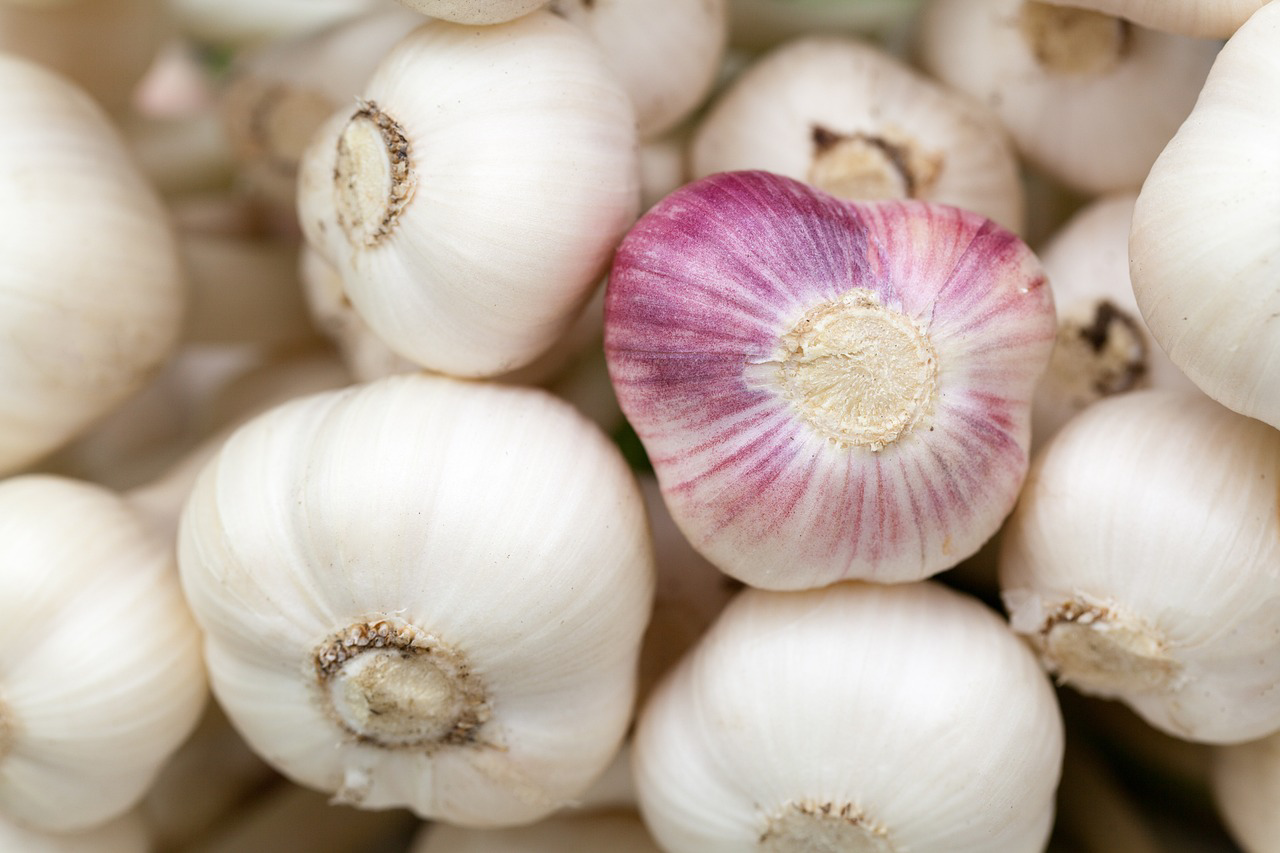Certainly, let's delve even deeper into the details of garlic's components and their effects:

**1. Allicin:** Allicin, upon formation, rapidly decomposes into various bioactive compounds, such as diallyl sulfides, ajoene, and vinyldithiins. These compounds collectively contribute to garlic's health benefits. For example, ajoene has antithrombotic properties, which means it may help prevent blood clot formation and reduce the risk of cardiovascular diseases.
**2. Diallyl Disulfide (DADS):** DADS, as one of the sulfur compounds in garlic, has been the focus of research due to its potential anti-cancer properties. It may inhibit the growth of cancer cells and induce apoptosis, a programmed cell death process, in certain types of cancer, including colon cancer and leukemia.
**3. Diallyl Trisulfide (DATS):** DATS has garnered attention for its potential in cancer prevention. Studies have shown that DATS can inhibit the growth of cancer cells, particularly in breast and prostate cancers. It may also help protect against DNA damage caused by carcinogens.
**4. Sulfur-Containing Amino Acids:** Garlic's amino acids, including cysteine and methionine, play vital roles in various physiological processes. Cysteine, in particular, is a precursor to glutathione, a powerful antioxidant that helps protect cells from oxidative stress and supports the immune system.
**5. Vitamins and Minerals:** Garlic contains vitamin C, an antioxidant that strengthens the immune system and aids in collagen production. Vitamin B6 is essential for metabolism and nervous system function. Manganese, another mineral in garlic, contributes to bone health and the metabolism of amino acids, carbohydrates, and lipids.
**6. Flavonoids and Polyphenols:**
Garlic's flavonoids and polyphenols, such as quercetin and diallyl sulfides, exhibit various health benefits. Quercetin, for instance, has anti-inflammatory properties and may help alleviate allergy symptoms. These compounds also contribute to garlic's overall antioxidant capacity, helping to neutralize harmful free radicals in the body.
Furthermore, garlic's potential health benefits extend to:
- **Antibacterial and Antiviral Properties:** Allicin and other sulfur compounds in garlic have demonstrated antimicrobial effects, making garlic a popular choice for natural remedies against infections.
- **Cardiovascular Health:** Garlic is known to have a positive impact on heart health by helping to lower blood pressure, reduce cholesterol levels, and improve overall circulation.
- **Anti-Inflammatory Effects:**
The compounds in garlic may help reduce inflammation in the body, potentially providing relief for conditions like osteoarthritis.
- **Digestive Health:**
Garlic can aid in digestion by promoting the growth of beneficial gut bacteria and supporting a healthy gut microbiome.
Remember that individual responses to garlic can vary, and some individuals may be sensitive to its compounds, experiencing digestive discomfort or garlic breath. It's always a good idea to consult with a healthcare professional, especially if you have specific health concerns or are considering garlic as a dietary supplement or therapeutic remedy.

**1. Allicin:** Allicin, upon formation, rapidly decomposes into various bioactive compounds, such as diallyl sulfides, ajoene, and vinyldithiins. These compounds collectively contribute to garlic's health benefits. For example, ajoene has antithrombotic properties, which means it may help prevent blood clot formation and reduce the risk of cardiovascular diseases.
**2. Diallyl Disulfide (DADS):** DADS, as one of the sulfur compounds in garlic, has been the focus of research due to its potential anti-cancer properties. It may inhibit the growth of cancer cells and induce apoptosis, a programmed cell death process, in certain types of cancer, including colon cancer and leukemia.
**3. Diallyl Trisulfide (DATS):** DATS has garnered attention for its potential in cancer prevention. Studies have shown that DATS can inhibit the growth of cancer cells, particularly in breast and prostate cancers. It may also help protect against DNA damage caused by carcinogens.
**4. Sulfur-Containing Amino Acids:** Garlic's amino acids, including cysteine and methionine, play vital roles in various physiological processes. Cysteine, in particular, is a precursor to glutathione, a powerful antioxidant that helps protect cells from oxidative stress and supports the immune system.
**5. Vitamins and Minerals:** Garlic contains vitamin C, an antioxidant that strengthens the immune system and aids in collagen production. Vitamin B6 is essential for metabolism and nervous system function. Manganese, another mineral in garlic, contributes to bone health and the metabolism of amino acids, carbohydrates, and lipids.
**6. Flavonoids and Polyphenols:**
Garlic's flavonoids and polyphenols, such as quercetin and diallyl sulfides, exhibit various health benefits. Quercetin, for instance, has anti-inflammatory properties and may help alleviate allergy symptoms. These compounds also contribute to garlic's overall antioxidant capacity, helping to neutralize harmful free radicals in the body.
Furthermore, garlic's potential health benefits extend to:
- **Antibacterial and Antiviral Properties:** Allicin and other sulfur compounds in garlic have demonstrated antimicrobial effects, making garlic a popular choice for natural remedies against infections.
- **Cardiovascular Health:** Garlic is known to have a positive impact on heart health by helping to lower blood pressure, reduce cholesterol levels, and improve overall circulation.
- **Anti-Inflammatory Effects:**
The compounds in garlic may help reduce inflammation in the body, potentially providing relief for conditions like osteoarthritis.
- **Digestive Health:**
Garlic can aid in digestion by promoting the growth of beneficial gut bacteria and supporting a healthy gut microbiome.
Remember that individual responses to garlic can vary, and some individuals may be sensitive to its compounds, experiencing digestive discomfort or garlic breath. It's always a good idea to consult with a healthcare professional, especially if you have specific health concerns or are considering garlic as a dietary supplement or therapeutic remedy.


